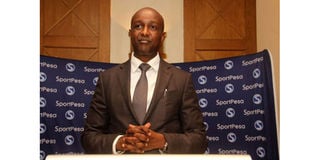Premium
Betting board goes after SportPesa firm

Sportpesa CEO Ronald Karauri during a past press conference.
What you need to know:
- The board is now threatening to withdraw the licence of Milestone for a second time.
- BCLB has now written a show cause letter to Milestone to explain why their licence should not be varied or cancelled.
The return of betting giant SportPesa has hit a new challenge.
This is after the Betting Control and Licensing Board (BCLB) wrote to Milestone Games Ltd, which is the new front of SportPesa, on Tuesday and accused it of obtaining its licence under one set of owners, only to later transfer its shareholding to another entity, thereby circumventing the board's due diligence requirements on betting company ownership.
The board is now threatening to withdraw the licence of Milestone for a second time. The firm had been cleared by the courts late last week to operate in Kenya using the SportPesa trade name despite the board's previous objections.
If it goes ahead with this threat to cancel the license, the board will have handed SportPesa, which has been fighting to get back into the game another major blow.
BCLB has now written a show cause letter to Milestone to explain why their licence should not be varied or cancelled.
The sector regulator, in the letter seen by the Nation, says Milestone has breached its licensing requirement that requires that before effecting any change of ownership of a company, it must notify the board in writing and seek authorisation or approval to that effect.
Statutory mandate
"The purpose of the said approval is to enable the board to discharge its statutory mandate of carrying out due diligence on the proposed new owners, directors and/or shareholders in accordance with the Act," the letter by board chairman Cyrus Maina dated November 24 reads.
It went on: "It has come to the attention of the board that the shareholding in Milestones Games Limited as at October 22, 2020 when its bookmakers licence was issued has since been changed in blatant breach of the aforementioned operation requirements," Maina says.
The BCLB says when Milestone applied for the bookmaker's licence, its shareholders were Nob Five Ltd (9,950 shares), and Wilson Ngatia Karungaru (50 shares).
At the time, Nob Five was owned by John Munene Nderitu (250 shares), Jackline Nyambura Kungu (500 shares), Joseph Muendo Mutua (250 shares).
It has also emerged from correspondence seen by the Nation that at the time Milestone obtained its licence from the Board, in early October, the company director with whom the Board corresponded was a nephew of a senior politician.
Changed ownership
Further investigations by the board have revealed that the firm later changed ownership, directorship and shareholding of Milestone Games Ltd to bring on board one more company — Selenium Limited, which is owned by Ronald Kamwiko Karauri
Mr Karauri is the CEO of SportPesa and holds shares in Pevans East Africa, and Francis Waweru Kiarie is another Pevans shareholder.
Pevans has been slapped with a Sh15 billion tax bill and its Bulgarian directors were deported at the height of the tax and licensing feud with the Interior ministry in July last year.
"The board views and considers the above actions of your company to be meant to circumvent the due diligence requirements and investigations that the board conducts while considering applications," the letter adds.
The regulator now wants Milestone to show cause in writing within seven days why its bookmakers off the course licence number 0000205 should not be varied or cancelled.
It also wants the firm and its directors of Nob Five Limited alongside Mr Karungaru to appear before it next Thursday at 11am for deliberations on the same.
This is the second attempt in a week to stop the SportPesa comeback to the market through a different company, —Milestone.
This comes days after the High Court allowed Pevans to once again access its bank accounts and paybills, upsetting the Kenya Revenue Authority.
The taxman sought to have the company's bank accounts frozen to allow it to investigate allegations of its tax evasion schemes.
The firm has also been accused of sucking profits out of its lucrative Kenyan business by paying millions of pounds to a software company it owns in the UK — an arrangement that has significantly reduced its tax bills.





